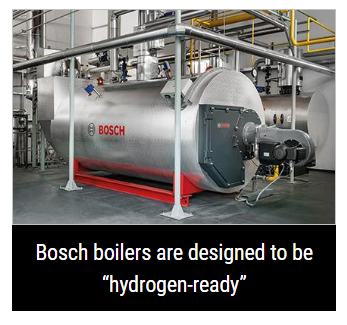
Daniel Gosse reveals how use of green hydrogen in boiler systems represents a significant opportunity in decarbonisation efforts
In the short- and medium-term, decentralised solutions with electrolysis and renewable energy are an attractive option for achieving CO2-neutrality quickly. But why should anyone choose the complex path of generating their own hydrogen, accepting a loss of efficiency of around 30% in the process? After all, green electricity can be used directly in electric boilers, achieving a high degree of efficiency. It’s a plausible response – on sunny or windy days, the electricity is directly available for use in plants and production with an efficiency level of approximately 99%. Due to the fluctuations in the availability of green electricity, which is affected by the weather conditions and time of day, however, an additional CO2-neutral energy source is required for compensation. This is where the benefits of hydrogen come to the fore: it can be stored at a higher energy density and achieves high degrees of efficiency when used. For these reasons, it is expected that hybrid heating concepts, such as boilers with multi-fuel burners and electric heaters, will become an ever more attractive option.
Technological Requirements
The use of hydrogen in boiler systems and the corresponding technology is established in sectors in which hydrogen is created as a waste product of chemical processes. As a result, there are a range of known technological requirements for safe, efficient handling. The following solutions, among others, are suitable for making use of this environmentally friendly gas. Since the hydrogen’s net calorific value per unit of volume amounts to around one third of that of natural gas, appropriate technical measures are required to triple the fuel volume. Measures to control the high combustion temperatures of approximately 2,000°C and the faster combustion behaviour must also be considered. This concerns pipes, nozzles, high-temperature-resistant components that come into contact with flames, burner fans and the combustion chamber, in particular. The hydrogen burner is usually designed as a complex multi-fuel firing unit with a correspondingly demanding control system, to enable full flexibility and supply reliability. The applicable emission regulations regarding NOx can be reliably met when using flue gas recirculation. To prevent reignition of the hydrogen firing unit in the fuel supply line, the combustion system optionally features a flame arrestor upstream.
Establishing A Sustainable Energy Supply
Green hydrogen and electricity represent a chance to comprehensively avoid CO2 emissions from fossil fuels. Currently, the limiting factors are still availability and economic feasibility – the technology itself, in contrast, is fully developed and ready for the use of hydrogen. For many new boiler plants, it makes sense to provide interfaces for later conversion and to design the boilers as “hydrogen-ready” or as a hybrid with an electric heating element. In some cases, it is also possible to modernise existing boiler systems for the use of alternative fuels for an acceptable cost.
BRIEF INTRODUCTION
Cnbearing is the No.1 bearing inquiry system and information service in China, dedicated to helping all bearing users and sellers throughout the world.
Cnbearing is supported by China National Bearing Industry Association, whose operation online is charged by China Bearing Unisun Tech. Co., Ltd.
China Bearing Unisun Tech. Co., Ltd owns all the rights. Since 2000, over 3,000 companies have been registered and enjoyed the company' s complete skillful service, which ranking many aspects in bearing industry at home and abroad with the most authority practical devices in China.



